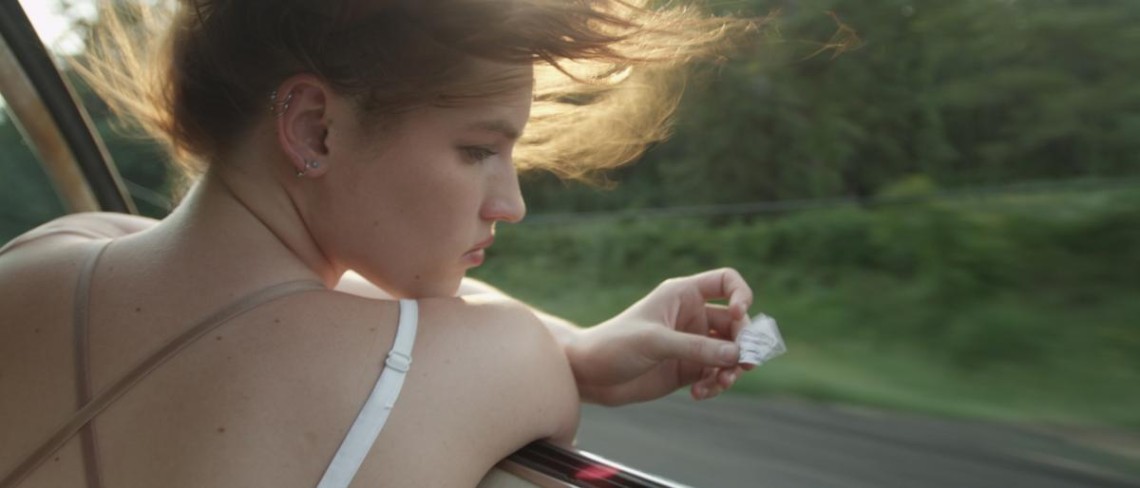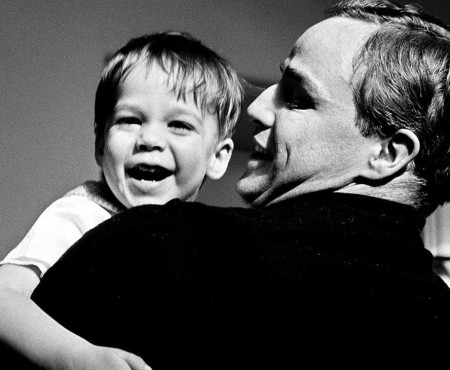The following is a review from the Atlanta Film Festival, running March 28-April 6.
The story of a struggling young artist embarking on a journey of self-discovery in the name of finding an obscure vinyl single recorded by her deceased father, Juli Jackson’s feature debut 45RPM may be the most indie-sounding movie ever made. To compound matters, the aforementioned artist, Charlie (Liza Burns), takes monochrome snapshots of people and bathtubs on an honest-to-God film camera, while companion Louie (Jason Thompson) is a music obsessive rarely seen without a trilby one suspects he purchased after asking a hatter for the most Elvis Costellian hat in the shop. The two meet in Memphis, where Charlie travels by bus when a phone mishap leads her to believe Louie’s record shop carries the record she seeks, and Louie gladly volunteers to chauffeur her to and around Arkansas to look for the 7” when he learns it may contain input from a mostly unrecorded bassist he reveres.
In short order, however, the film breaks away from the modern indie pack. Befitting its propulsive MacGuffin of a forgotten garage rock single from the ‘60s, 45RPM brings back the out-of-fashion road movie, trading urban ennui and listlessness for the cautious optimism of Two-Lane Blacktop. Hell, even Louie’s car comes from a different era; it looks like it would show up for an emissions test the way men used to show up for physicals in old movies, with lit cigarettes dangling from their lips as they breathe with a stethoscope to their chests. There’s an old-school charm to this setup that ducks the morose seriousness taken as mature and wizened. Even the fact that Charlie’s estranged, now dead father played on the single she desperately wants comes second to her simple need to find the record to unlock the lifelong impact it has had on her since hearing it as a child. Charlie’s art suffers from being unable to fully process and move past her vague but commanding memory of the music, while the painful family background coded into it provides only context for her character, not definition.
Working on a microbudget, Jackson circumvents inevitable restrictions of scope in inventive ways. Animation is used in lieu of expensively produced montages of travel, and the rough pencil sketches filled in with dashes of color for the rare sign or field that catches the eye do not only document the duo’s movement through Arkansas but better reflect the nature of a road trip through homogenized terrain, where only one or two things here and there stick out enough from the sameness to be noticeable. The animation also helps bypass the film’s one stunt, of a leap off a bridge that sidesteps the logistics of tracking the plunge and filming underwater with no time or money to spare. These transitional moments are further enlivened by a surprisingly varied, deep soundtrack, which takes advantage of the emphasis on obscure garage rock to serve up a host of cheaply licensed buried gems and revival acts homegrown on Arkansas soil.
David Gordon Green’s Joe kicked off the Atlanta festival with a rural Texas drama shot on-location and partially cast from locals, but that film painted an exploitative, stereotypical image of Southern poverty, one filled with fetid trash strewn over the yards of dilapidated homes and roving bands of drunken, violent hicks. 45RPM features a few jokes at the expense of Arkansas’ stretches of rural tedium and even shows an entire bathroom out on an open porch, but not once does it feel condescending to or resentful of its roots. Thompson himself hails from Little Rock, and Louie’s boho mannerisms and encyclopedic knowledge of musical arcania complicate the mental image that Charlie (and maybe Burns herself, who comes from Oregon and is based in L.A.) may have of Southern folk.
The other characters further erode stereotypes, presenting people as friendly, passive-aggressive, self-absorbed, obliging and above all as people, set in their ways by their location but unpredictable and disorganized the way actual human beings are. One character who provides a much-needed clue for Charlie’s search seems like she tumbled out of one of the Coen brothers’ most affectionate throwaway parts, while another is played by actual Coens veteran Candyce Hinkle, who stole some early scenes of True Grit as the blithely pious landlady.
The film dabbles in questions on the nature of art and how to handle and overcome those foundational, youthful moments of artistic discovery, yet refreshingly the most on-the-nose speech on this subject is relegated to an openly chided monologue from Louie about the postmodern crisis he endures at the thought of making music of his own without having all of his influences sorted. Instead of belaboring this point, the film cuts loose and simply sinks into the rhythms of the film’s benign mystery, and of the relationship between Charlie and Louie, one that opts neither for budding romance or profound Platonic appreciation but natural, slowly evolving trust and friendship. There are a few stumbling blocks, from some occasional (and mercifully brief) hiccups in the sound mixing to a performance from James Paskel that momentarily suspends the otherwise naturalistic tone to let a kind of hobo Sam Phillips punctuate every other sentence with a muttered “Gubbermint.” Nonetheless, 45RPM is the sort of movie that demonstrates how low-stakes drama and gentle humor can make for adult cinema as much as miserabilism and irony.




















